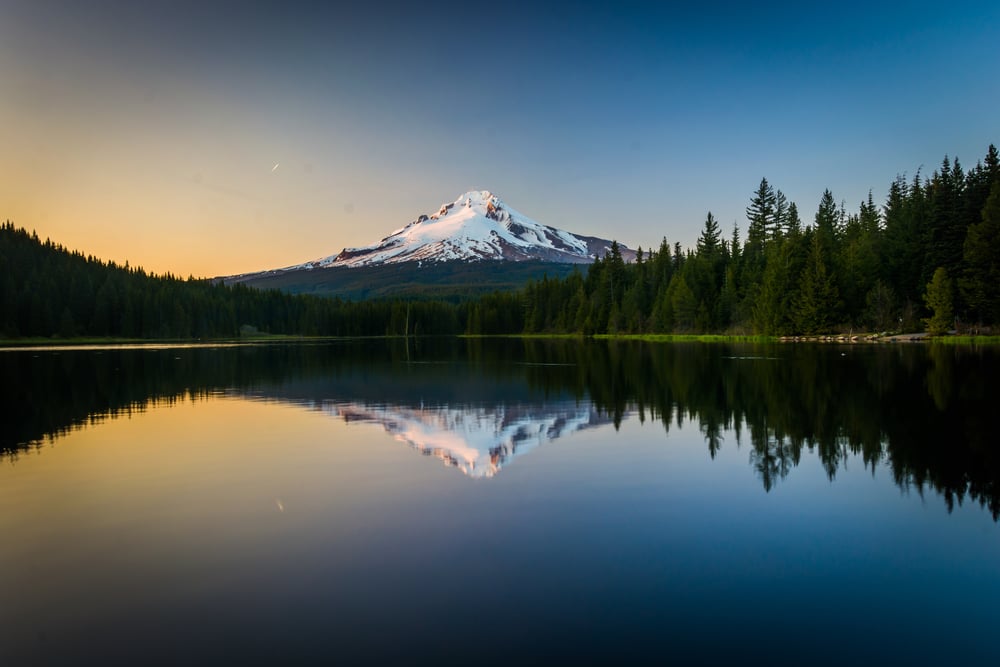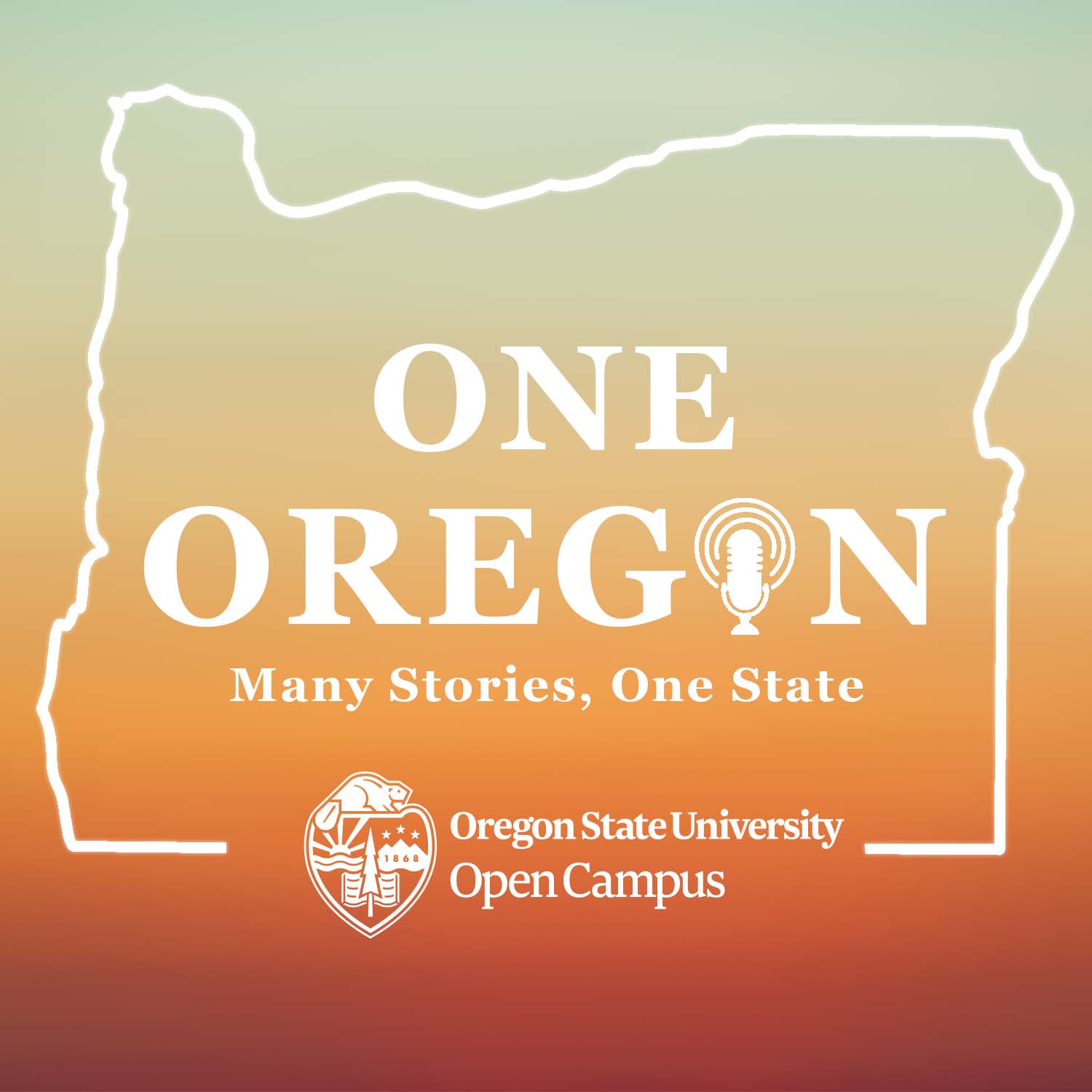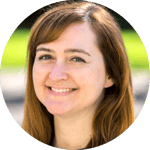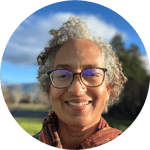Episode 01 Transcript:
Hi everyone, I’m Emily Henry and I’m Ann Harris...welcome to One Oregon, a podcast featuring stories from real people from across our state sharing about their experiences and lives.
We hope that hearing their stories will help to break down barriers and smash pre-conceptions that we may have in our minds about what it means to be an Oregonian (and that you will hear something you can relate to or appreciate in each of them). It is our intention this podcast will have a positive ripple effect that will help to bring us all together as One Oregon.
Today we are joined by Joyce Senior Angulo and Adejoke Babatunde. Joyce is the statewide coordinator for the Expanded Food and Nutrition Education Program at Oregon State University. Adejoke worked at OSU at the time of this interview but now is a Continuous Quality Improvement Coordinator in the Maternal and Child Health Section at the Oregon Health Authority. Joyce joined us for this interview from her home in Astoria, Oregon and Adejoke joined us from her home in Portland, Oregon.
Emily: so we would like to start today with hearing where your Oregon story begins and Joyce do would you like to go first?
Joyce: I came to the US I'm from Costa Rica almost 10 years ago and I first lived in South Carolina I went to Clemson University and that's where I got my PhD in food technology but my area of expertise is nutrition education so right after graduation, I was looking for opportunities In the US and then I came across this nutrition education coordinator position in Astoria. I had never heard of this place all I knew Is that It was close to the ocean and I love the ocean and so I applied I got the job I started at OSU Extension Service may 1st of 2016. so yeah it's been over five years I've always lived on the coast my role with OSU has evolved but the place where I live has not and it's just because I I still love the ocean and it's been a very nice community to be part of
Ann: Adejoke…tell us about your Oregon Story
Adejoke: I am a first generation Nigerian American and my family came to Oregon mostly in pursuit of education so my father migrated here first through a sponsor program and ended up receiving his doctorate degree In urban studies and planning so soon after my mother who was a midwife In Nigeria joined him In Portland and she actually studied public health as well as I did and so um anyway so once they came here they had their three children I am the middle of three and so uh I was mostly raised In Portland but had an opportunity to live in Kwara state Nigeria for about five years of my childhood and then we moved back to the US I started elementary school
Emily: Adejoke and Joyce met at OSU’s Family and Community Health Spring Conference in 2016 and connected immediately.
Adejoke: we were at the conference and then you know It was just like love at first sight she walked In and just being you know the only two black women at the conference In Portland It was just like an immediate magnetic force that drew us to each other
Joyce: I had just been hired for like maybe two weeks and uh and we became sisters Instantly It was just such a special connection from the very beginning
Ann: This connection developed into their partnership on My Hair My Health PDX! The mission of this program is to create a safe space of healing and celebration that inspires black women and their families to live their best lives. The My Hair, My Health program originated in San Bernardino, California and Joyce and Adejoke worked with a team to bring the program to Portland, with the first event in 2017.
Joyce and Adejoke – many listeners may be wondering about how the connection between hair and health. Can you share with them why it is so natural and relatable and important for Black women?
Adejoke: To me, the phrase my hair my health It's a term that I feel people who can Identify with living the black experience and have a heritage within the African diaspora It's kind of an unspoken term that really connects us just by being who we are and when It comes to our hair It's really an extension of our Identity and our culture and so when we look at hair and health It really goes hand In hand and it's really a reflection of our societal experiences and systemic Issues that need to be addressed
Joyce: there's research out there now that shows that we exercise less and It's because we're trying to keep our hairstyles Intact or as fresh as possible. The program started as a way to remove that barrier to being physically active but we also dive into other topics as you know mental health and spirituality self-love and self-care so that's kind of like the gateway but It's definitely so much more than just hair
Adejoke: we talk about physical activity we talk about healthy eating and being active but then with that we have to ask ourselves why Is It that maybe one wouldn't be as physically active as one might want to be we talk about our hair and the negative perceptions or Impact that we might think of when It comes to exercise and sweating out our hair or our hairstyles especially when we've Invested so much time and money and resources to maintaining a certain type of um hairstyle so this program Is also about overcoming barriers to being physically active and more so making sure that we're just addressing holistic health we might think about having exercise friendly hairstyles that are demoed within some of the workshops but then conversations could take a turn and we could all of a sudden be talking about well what does It really mean to society In terms of the standards of beauty and where Is that coming from usually It tends to be the lighter the skin the straighter the hair and to what extent do some of us go through In order to actually reach for that standard of beauty those are all conversations that come up In our events like It could be relating to colorism or social Justice and then deeper we do deeper rooted Issues
Ann: Portland was the natural site of My Hair My Health in Oregon with over 75% of Oregon’s black residents living in the Portland Metro area. But there are also Black Oregonians living in every county in the state. In 2020 My Hair My Health pivoted to a virtual event as a result of the pandemic but with the benefit of being able to reach beyond Portland. As a Black woman living in rural Oregon, this is really exciting to me. The program has been really empowering and enriching for me… and I see a lot of potential for it to connect to many other rural Black women, maybe to help bring us together as a virtual community!
Joyce: we had to do our event virtually and I think that kind of put those barriers down because we could pretty much just reach out to anyone who could join and I always mentioned this because for me It's kind of a point of like pride and joy that you know I had my sister from Costa Rica joining and I had some other cousins In Texas, in Bahamas you know that you know joined for a little bit so just being able to kind of share with my own family some of my work and what I'm really passionate about It was just really great but we do need to Increase our outreach for sure to rural Oregon because there are some of us out there In rural Oregon and we want to make sure that we can reach as many people as possible and doing things virtually that really has kind of worked on our favor
Emily: so you all have both really beautifully spoken about the connection between hair and health and so we're wondering how might this notion of bringing two things together that may just like at first glance seem disconnected apply In different ways to different audiences?
Adejoke: two things or topics may seem disconnected may Imply that the person who sees It as such Is not really familiar or can't really contextualize how the topics might Intersect so I feel like when this happens It's better to have a place of reference and to be able to attach meaning to It and so through that I think comes educating yourself and being exposed to understanding how the two things may or may not connect or why It might matter to people.
I know that both Dr J and I had spoken about cultural humility before but once again It just comes down to listening and learning and being exposed to other truths and realities that different types of people experience and welcoming It things might look different to different cultures and audiences but It's always I think best practice when It comes to equity driven and practice public health that we really understand the nuances and just learning more from people from all types of backgrounds and walks of life
Joyce: I think our main message with My Hair My Health Is to you know celebrate beauty and wellness from the inside out and I think anyone regardless of how your hair looks or your skin color anyone can relate to that we all need a lot of self-love self-care and healing our body mind and soul especially now In the times that we're living.
With my hair my health we are focusing on the most marginalized and so we just want to make sure that we're uplifting you know the black women and their families because they tend to be the ones who are the most disenfranchised and underserved and you know there Is so much diversity and richness In our culture and our history that we want to like uplift and celebrate that we don't want to keep focusing on statistics or whatever Is wrong but on what makes us beautiful and powerful we have the tools to heal ourselves and heal our communities but we gotta do It our own way and that's what we're trying to do uh with My Hair My Health PDX and beyond
My Hair My Health PDX! recently celebrated their 5th anniversary and is now an official 501(c)3. The program has hosted over 400 participants with presentations and products from over 100 panelists and local vendors. The program has also received local and national awards.
We asked Joyce and Adejoke to us more about what’s next?
Adejoke: as each year goes by we're definitely learning more and we are trying to get better at truly understanding success apart from other organizations or businesses or groups especially here In the metro area and so I'd say that In 2021 our main focus has really been about creating and expanding our brand Identity and just solidifying what we truly represent. recently we developed our vision and mission of centering the holistic health of black women and their families and we do this by creating events and producing events that Inform and Inspire our community and sisterhood to really live our best lives
Joyce: we're so excited! we are so excited and over the moon to have kind of like our standalone organization our 501c3 what Is next for us Is to continue building that capacity and setting the foundations for for our organization our guiding principles are still centering black women and their families and generational healing, food and movement, mind body and soul and you know just having this place where we can actually celebrate all of those things we're very excited about the future and just knowing that we have that freedom to plan and organize and fundraise and just adapt the programming to the communities where we come from and that we want to serve It has given us such amount of joy you probably can hear It through my voice I'm just so so excited It's been one of the highlights of our year for sure
And we end today the same way we always do…by asking, what is something you love about your community?
Joyce: well what I love about my community Is how resilient we are how powerful and beautiful we are we have been able to overcome so much and there Is so much beauty In what we have been able to um overcome and accomplish and we just keep on keeping on wherever I go If I see another black person I Immediately smile that's just like the unspoken code If you see a black person anywhere you just smile and say hi you know we kind of like see each other recognize each other and that It's not just like the US anywhere you go In the world that's just the way that's just the way It Is
Adejoke: I feel like I also think of community In the broader aspect anyone that could really having an African heritage um from that standpoint just how rich In culture and traditions It Is and regardless of what our resources may be what we have access to we continuously create and Innovate and whether It be from our ancestral times up until now that hasn't changed and so I think just It's really Important because these facts just make me more and more appreciative of our heritage I know growing up I wasn't really aware that there are so many people who are black that are Inventors and created so many things that we just take for granted such as the fridge or the a mop or you know traffic signals and so I think It's really Important to share these messages with the younger generations to really embrace and have that cultural pride Is really Important and makes us all the more confident In being who we are
Joyce: I have so much appreciation for Adejoke and again she's my sister and we're gonna have this connection for life and we're just very excited to put those seeds on the ground and just watch It grow because It's just gonna be amazing It's been amazing this past five years and I know It's just going to continue to be even bigger and better In the future
Ann: Great – Adejoke?
Adejoke: ditto everything we can't thank you enough for this time and opportunity to share our stories
Thank you to Adejoke and Joyce for taking the time to chat with us and share more about their partnership and My Hair My Health PDX! If you want to learn more about the program, visit their website at myhairmyhealthpdx.org
You've been listening to One Oregon: Many Stories, One State. I’m Ann Harris and I’m Emily Henry.
We want to thank Tim Mayer, jazz piano player and jazz activist, for offering his time and talent to creating a uniquely Oregon musical environment for our podcast.
And a huge thank you to Rick Henry, editor extraordinaire, for his patience and persistence in guiding us through this first season - we could not have done it without you.
Thanks to you for listening, please tell you friends about us! We hope you’ll join us again for another episode of One Oregon







